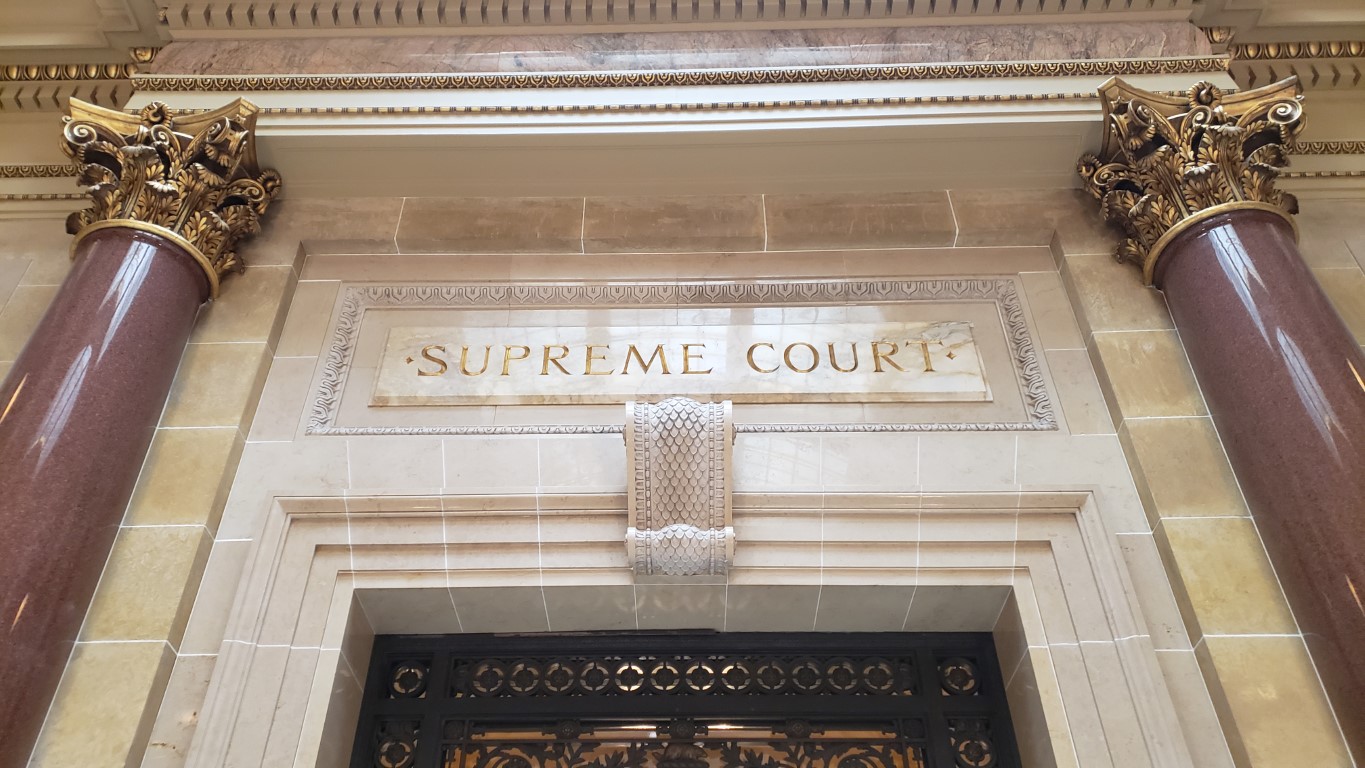Liberal Supreme Court candidate Jill Karofsky traded barbs with sitting conservative Justice Daniel Kelly, accusing Scott Walker’s appointee of ruling on cases involving conservative causes in a way that “feels like corruption.”
“It just defies logic that every time a group that has a conservative interest, that has a Republican interest, comes before the court, that you are always able to find in their favor,” the Dane County circuit court judge said Tuesday at a Supreme Court candidate forum in Madison. “It just defies logic that the law is always on their side.”
But Kelly dismissed the charge, touting an impartial, “all about the law and logic” methodology that he said he employs to decide cases and write opinions since being appointed to replace retiring Justice David Prosser in 2016.
“When we put on that black robe, we set aside all of our personal beliefs and opinions and preferences, and we simply apply the law,” he said.
>> WisPolitics is now on the State Affairs network. Get custom keyword notifications, bill tracking and all WisPolitics content. Get the app or access via desktop.
Kelly, Karofsky and Marquette University Law School Professor Ed Fallone met publicly for the first time ahead of a Feb. 18 primary in which the top two vote-getters will advance to the April 7 general election.
Tuesday’s forum was hosted by the Madison lawyer chapter of the American Constitution Society.
Karofsky’s line of attack largely focused on what she claimed was a politicization of court.
“I find it amazing that we have a justice on the Supreme Court who has been supported by right-wing special interests, who has continued to receive the support of those groups and every single time when he has made a decision on the Supreme Court, he has made that decision in favor of those exact same groups,” she said.
But Kelly fired back that in her role as a circuit court judge, Karofsky “scores the outcome of the case according to a political lens, and she decides whether or not that’s fair.
“Unlike Judge Karofsky, I don’t judge the results of the case according to a political lens. I judge it according to what the law requires,” he said.
And Kelly defended the court’s reputation, noting while he had “heard the same stories” of polarization before his appointment in 2016, he was “pleased to see that the court was already well on the way to healing those divisions” by the time he arrived.
Still, Karofsky cited a suit challenging the legality of laws passed in last December’s lame-duck session in which the conservative-controlled court “didn’t even let that case have an evidentiary hearing” as proof conservative justices “overturn cases just because they want to.”
“They’re not even following a process, because they are so eager to get at the end result,” she said.
Kelly countered that Karofsky “obviously hasn’t looked at the logic” employed by justices in that case, and if she had, she would realize it was “a pretty easy case.”
“There’s no need to have a hearing,” he said. “Judge Karofsky knows that you have hearings when there are factual disputes, and there was no factual dispute in that case. It was purely a question of law — and a pretty easy question of law at that.”
Fallone took a different tack.
At times, he was a peripheral figure to skirmishes between Kelly and Karofsky, joking at one point he felt like “the net in a badminton game” as he passed the microphone back and forth from his seat between the two other candidates. Fallone ran unsuccessfully for the court in 2013.
When he was given the opportunity to interject, Fallone told the audience he was “not accusing (Kelly) of making decisions based on partisan political motives.”
Instead, he charged Kelly was “an ideologue who follows his own pet theories of constitutional interpretation, his own idiosyncratic originalist view of what he believes was the original intent of the constitution and who thinks he’s a one-man constitutional convention.”
“I think the danger is he reaches out to decide constitutional questions unnecessarily in case after case because he believes it’s his job on the court to remake our constitutional law and to overturn precedent that he believes was decided incorrectly,” he said.
But Kelly took several shots at Fallone’s resume, quipping that while Marquette professor had been “teaching the law, I’ve been doing the law.’ He responded with a scornful briefing of “how (the judicial process) actually works.”
“Part of the responsibility of looking at precedent is understanding that sometimes prior courts have gone awry and we don’t double down on mistakes,” he said.
But despite diverging criticisms, Karofsky and Fallone agreed Kelly played a role in voters’ lack of trust in the state’s highest court.
Fallone said there is “general agreement that we’ve lost our way with our state Supreme Court” after previously having “a national reputation for independence and quality of decision making.”
He promoted himself as the change candidate and said the way to restore faith in the court was to “select justices who have a broader range of legal experience, not just coming from the same self-selected small universe of narrow perspective of a former prosecutor or someone who’s a Federalist Society member.”
“We have enough, it’s time for justice with a broader legal experience,” he said.
Karofsky wrapped up by touting herself as the only candidate who has “been on the front line of our court system,” noting her experience in the Department of Justice’s Office of Crime Victim Services.
“This isn’t some esoteric exercise… when you are a victim of crime,” she said, before quickly leaving the venue to return to a case in her courtroom.
Kelly, meanwhile, highlighted his experience as a private practice attorney and special prosecutor and painted himself as the candidate who has “been there and… done that my entire career.”
“There is the breadth of experience that I have that cannot be matched,” he concluded.
Watch the forum:
https://wiseye.org/2019/11/19/


